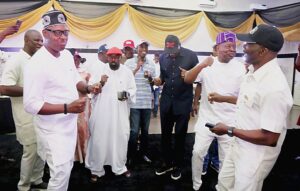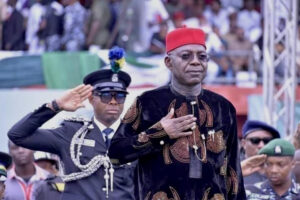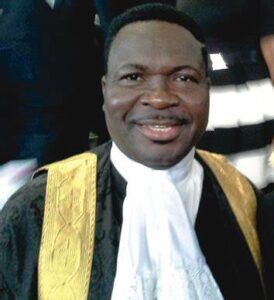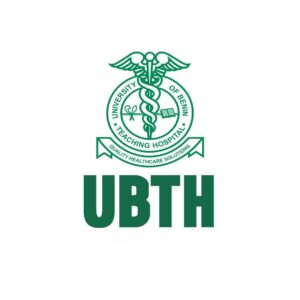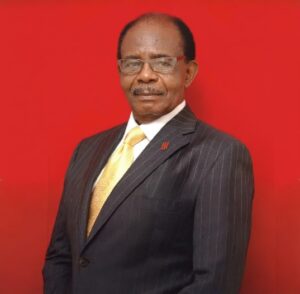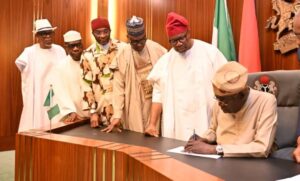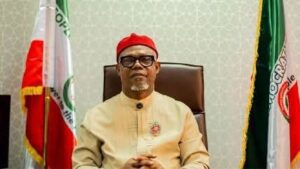Nigeria: X-raying The Past, Facing The Challenges of The Future
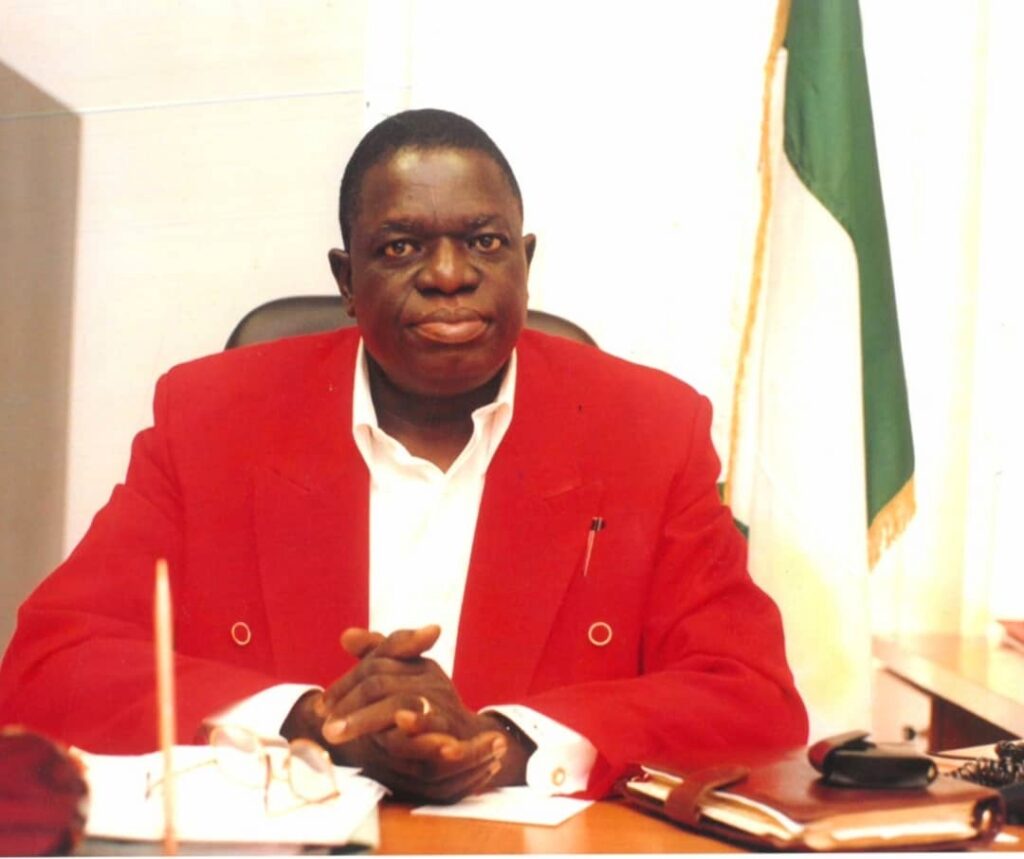
Senator Owie
By Senator Rowland Stephen Owie
Gathered here today is a congregation of individuals connected by the intricate tapestry of history and aspirations. Within our borders lies the expanse of Nigeria, a nation teeming with untapped resources, both natural and human.
The foundation of this great nation was carefully laid by our founding fathers, their vision manifested through the principles of true federalism.
It was an era when the Northern, Eastern, and Western regions stood as autonomous entities, nurturing their own resources, their unity embodying the Federal Republic of Nigeria. Given concerns about subjugation within the Western region the peoples of the then Benin and Delta Provinces sought self-determination and this led to the creation of the Midwest region via a constitutional plebiscite.
All the four regions enjoyed their independence as was expected in a true federal system. Recollections of that era reveal a vibrant landscape where prosperity knew no bounds.
The Northern region bore the crown of groundnut pyramids, the Western and Midwest regions were lush with rubber, cocoa, and industry, while the East’s bounty included coal and other commodities.
In a harmonious dance of progress, the nation thrived, boasting the premier television station in Africa, courtesy of the Western Regional government, coupled with free education, healthcare, and assured employment opportunities.
The symphony of industries resonated across the land, with names like Volkswagen, Peugeot, Delta Steel Company, Delta Glass and Iwopin Pulp and Paper Mill imprinting themselves on the nation’s identity.
At a point in our history it was 60 kobo to one Dollar and 90 kobo to one Pound Sterling, but unfortunately the military struck and destroyed the harmony we once enjoyed in the Nation.
The Incursion of the Military
And then, history took a fateful turn. Enter the military, with its discordant notes. The very architects of development – the civil servants – found themselves cast aside by the younger generation of officers.
The shockwaves of senior dismissals reverberated through the corridors of power, leaving behind a trail of disillusionment.
Corruption, that insidious adversary, seeped into the nation’s bloodstream, gradually eroding the values and principles that once held us united.
For context, it is instructive to note that prior to the advent of the Military in 1966, civil servants were the key drivers of development in the various Regions.
For instance, when political office holders were travelling, it was the civil servants that were in control of expenditure and the retirement of same at the end of the duty tour.
Because Ministers or Commissioners had no direct access to monies, there was considerable honesty in the federal civil service and those of various regions.
In a similar vein, when young officers realized that senior officers were being dismissed on television by the military government especially that of Murtala Mohammed, they decided to figure out a way to take care of themselves and secure their future.
Regrettably, the civil servants were now the people telling the Ministers and Commissioners how their elders and seniors were removed on television and then started advising them on the best ways to steal.
Corruption thus found its root Nigeria and the system got destroyed because of the irresponsibility of the military who compromised the civil service and, in turn, destroyed Nigeria.
The Second Republic
From these tumultuous times emerged the Second Republic, a period rife with electoral intrigues. The specter of unresolved power struggles cast a shadow over the horizon, as the potential for a nation-building leader was thwarted by a judicial decision.
The promising path forward was blocked, altering the trajectory of Nigeria’s history forever.
Indeed, the 1978 Transition Decree had a provision for Electoral College and after the election, there was no clear winner between the NPN (National Party of Nigeria) and the UPN (Unity Party of Nigeria), GNPP (Great Nigerian People’s Party), NPP (Nigerian People’s Party) and the PRP (Peoples Redemption Party).
The two leading candidates were Shehu Shagari and Obafemi Awolowo and because I was a member of the House of Representatives under the UPN, we started holding meetings among ourselves – members of the PRP, GNPP, NPP, and UPN who had majority in the two chambers of the National Assembly.
We had discussions in the build up to the Electoral College that would have given Awolowo the presidency of Nigeria and certainly, if Awolowo had been elected in 1979, Nigeria would have been turned to Dubai because he would have replicated what he did in the Western Region.
Unfortunately the judiciary, brought in a new dimension of two/third majority with the infamous principle of “12 2/3 “, a judgment which destroyed our political, economic and the civil lives.
I feel strongly that God, who is who is only just God will question all those who orchestrated this calamity.
Fast forward to the 1999 transition, a time of hope and change. Yet, even in this new dawn, the harbingers of progress were smothered. Iconic institutions like Ajaokuta and Aladja lay in ruins, their promise eclipsed by neglect.
The very infrastructure meant to propel us forward was dismantled, as short-sighted decisions by the Obasanjo administration paved the way for desolation, hunger and strife.
Message For the Current Administration
Like I said earlier, there was a time in Nigeria when it was 60k to a dollar and 90k to a pound, and our government was working hard, as at today, this is a country that produce oil with four major refineries, I am not sure that in the last 12 years our refineries have produced a gallon of petrol, they said they were paying subsidy but only God knows where the subsidy was going to.
We find ourselves at a crossroads, gazing at a Nigeria that has weathered storms and faced its fair share of tribulations.
The refining fires of adversity have tested the mettle of this nation, revealing both the cracks and strengths within our collective spirit.
Our once abundant refineries stand dormant, echoing the silence of opportunities squandered, as subsidized funds seem to vanish into thin air. It is the resilience of Nigerians that bears the brunt of such misfortune, as the cost of living soars and the burden of inflation weighs heavy.
Yet, amidst the challenges, there remains a glimmer of hope, a vision of a rejuvenated Nigeria. As we move forward, the echoes of the past still resonate, reminding us of leaders who embodied selflessness and service.
The legacy of Obafemi Awolowo, Lateef Jakande, Nnamdi Azikiwe, and Tafawa Balewa serves as a beacon, reminding us that leadership should be an act of devotion, a commitment to the welfare of the people.
To the current administration, the tapestry of history calls upon you to uphold this sacred duty. Our refining infrastructure, a cornerstone of economic growth, must be revitalized, no longer languishing in dormancy.
The burdens borne by ordinary citizens cannot be ignored, for their resiliency should not be taken for granted. A government of integrity must be composed of individuals with unblemished records, ready to serve with devotion.
Moving forward
Leaders should the lives of the Obafemi Awolowo, Lateef Jakande, Nnamdi Azikiwe, Tafawa Balewa and Ahmadu Bello, who were there for the people and not for themselves. One cannot find any mansion that was built by the Sardauna of Sokoto, neither can one find any in Bauchi that is owned by Tafawa Balewa.
These leaders served the people with the fear of God. But today, can we say that of the present leaders? What are we doing with the villages in the north that are now shadows of themselves?
Children holding plates begging along the road in Sokoto, in Kano in almost all the major cities in Nigeria. Is that the legacy we want to leave for our children?
It is unfortunate that daily, very many of us do not realize that we come with nothing to this world and we are returning back to our maker naked and without anything. Let our leaders emulate the lives of our forbears.
Government should ensure that our rural areas are developed, as a vast proportion of those who are supposed to stimulate growth in the rural areas there are now idling away in the city.
Even the traditional rulers of these communities now stay in the urban areas and visit their domains sparingly.
Conclusion
We stand at a precipice, our future uncertain yet pregnant with potential. Let us, as a nation, embrace our roots and nurture them.
Let education be a cornerstone, accessible to all, echoing the days when free education was not just a promise, but a reality.
Let agriculture thrive once more, as it beckons our youth to harness their skills, steering clear of distractions that divert their energy.
In the heartlands of our rural communities lies a wellspring of opportunity. Let them flourish, as once seen under the mantle of local government independence.
May our leaders heed the clarion call to empower our local councils, rejuvenating a legacy of development that had previously flourished.
In conclusion, our path forward demands unity, sacrifice, and commitment. The mothers of our nation must be at the forefront of nurturing values in our children, imparting lessons that endure beyond material wealth.
As we tread this intricate journey, let us remember that we arrive and depart with nothing, and our legacy will be judged not by our acquisitions but by the positive impact we leave behind.
May the spirit of our founding fathers guide us, as we work tirelessly to rekindle the embers of Nigeria’s promise.
Together, we shall craft a future where prosperity is shared, unity is upheld, and the dreams of generations past become the reality of generations to come.
Distinguished Senator Rowland Stephen Owie delivered this paper at the 2023 Midwest Achievers Awards on Sunday, August 20, 2023, at Lagos Oriental Hotel


